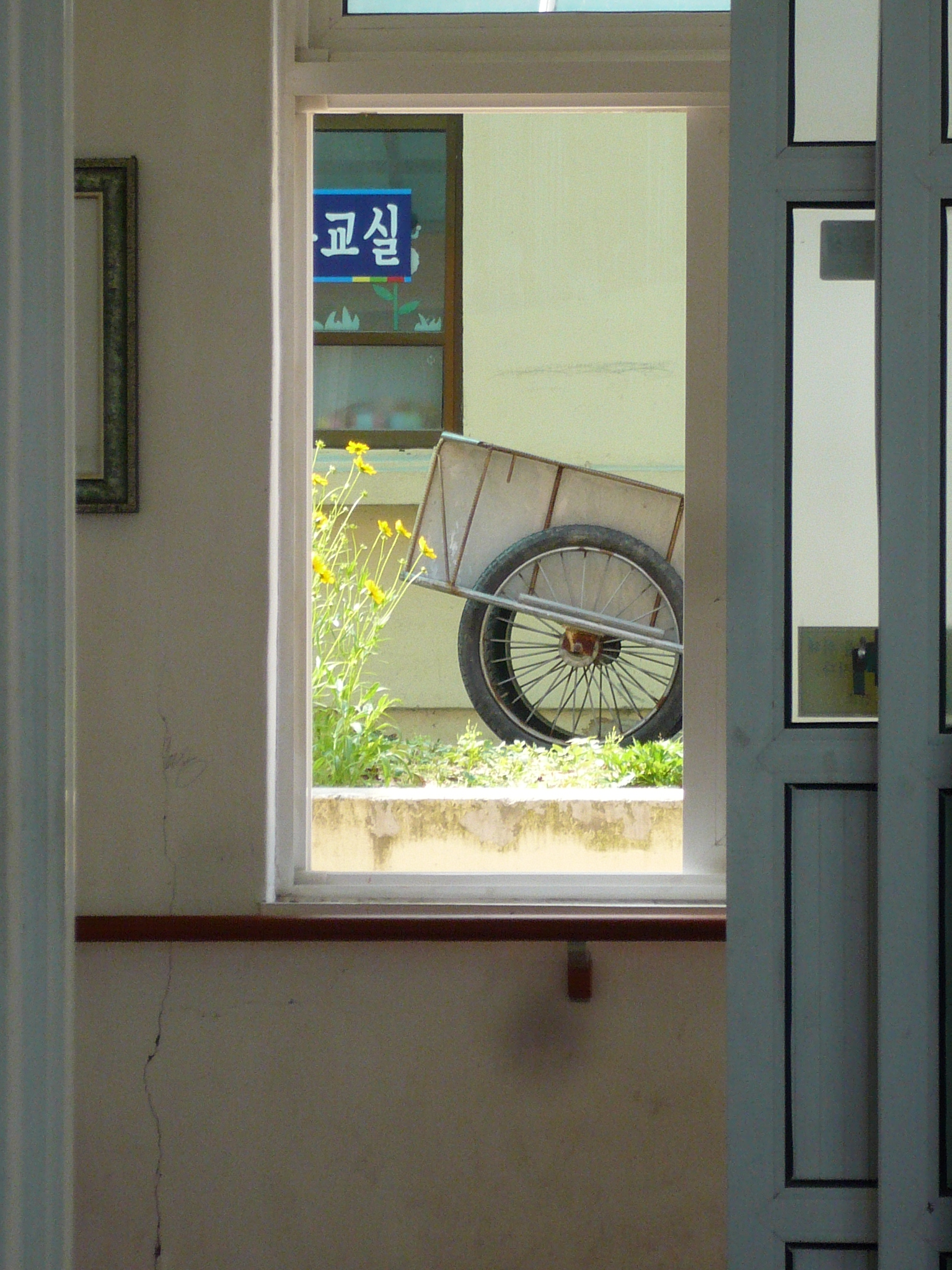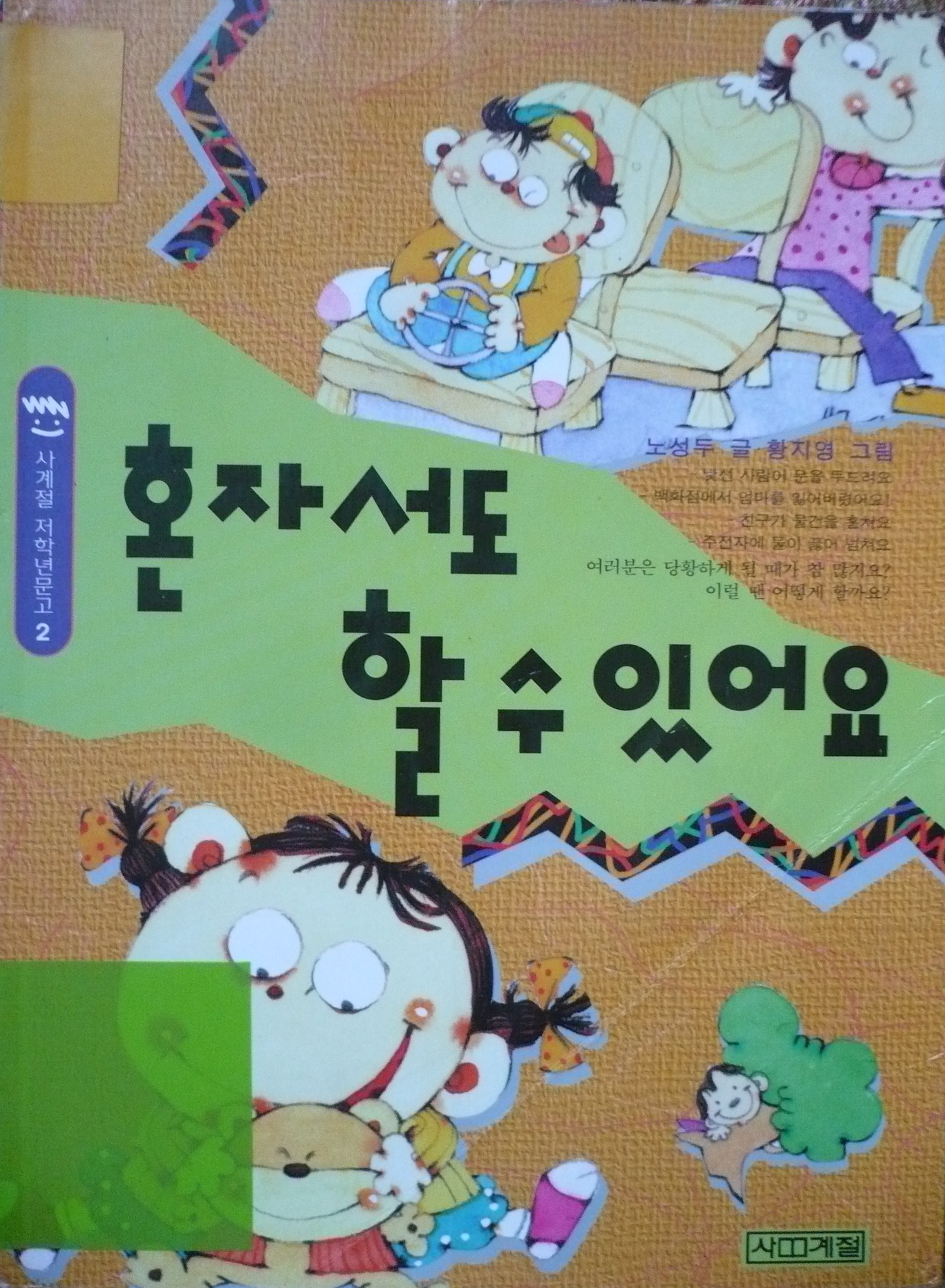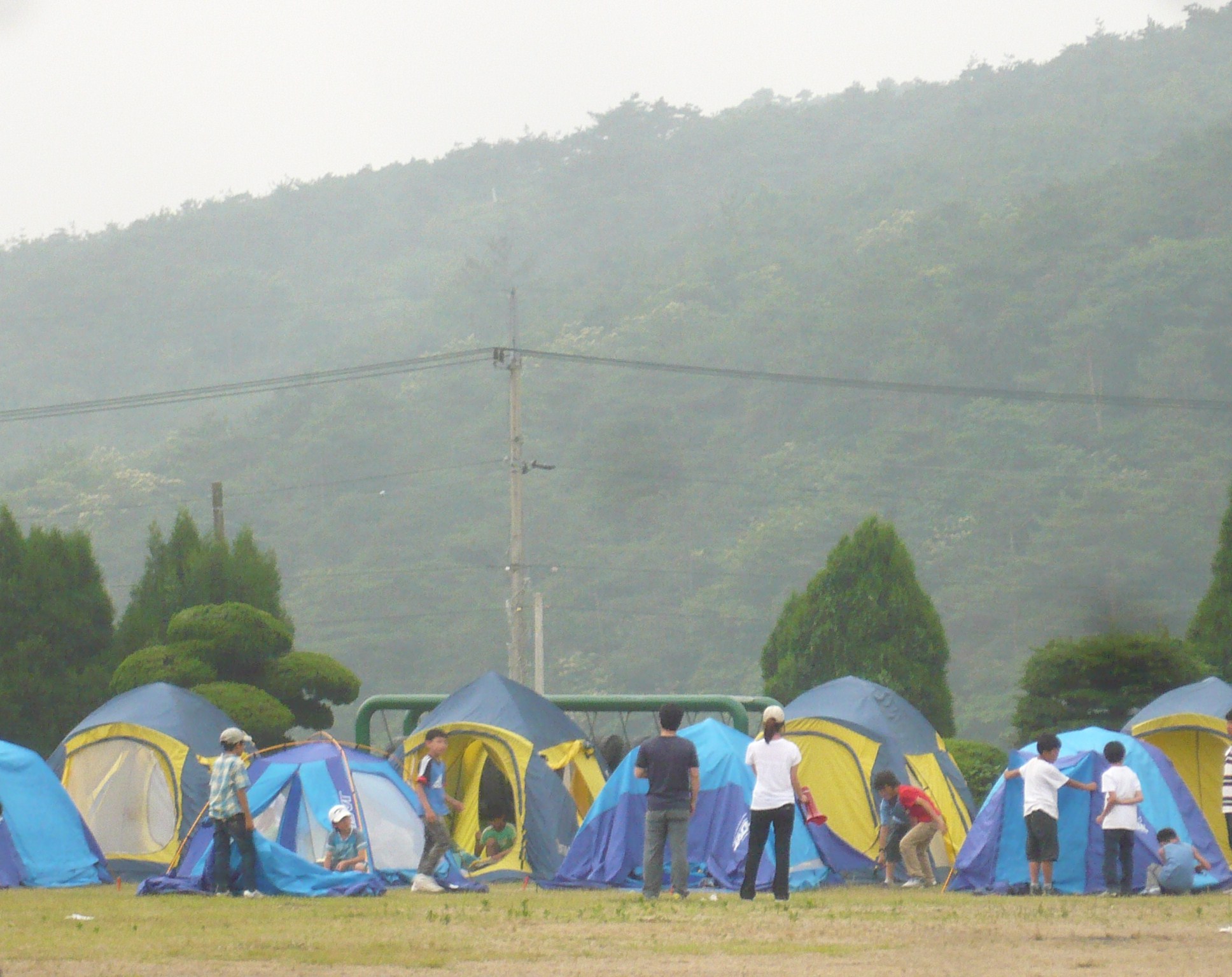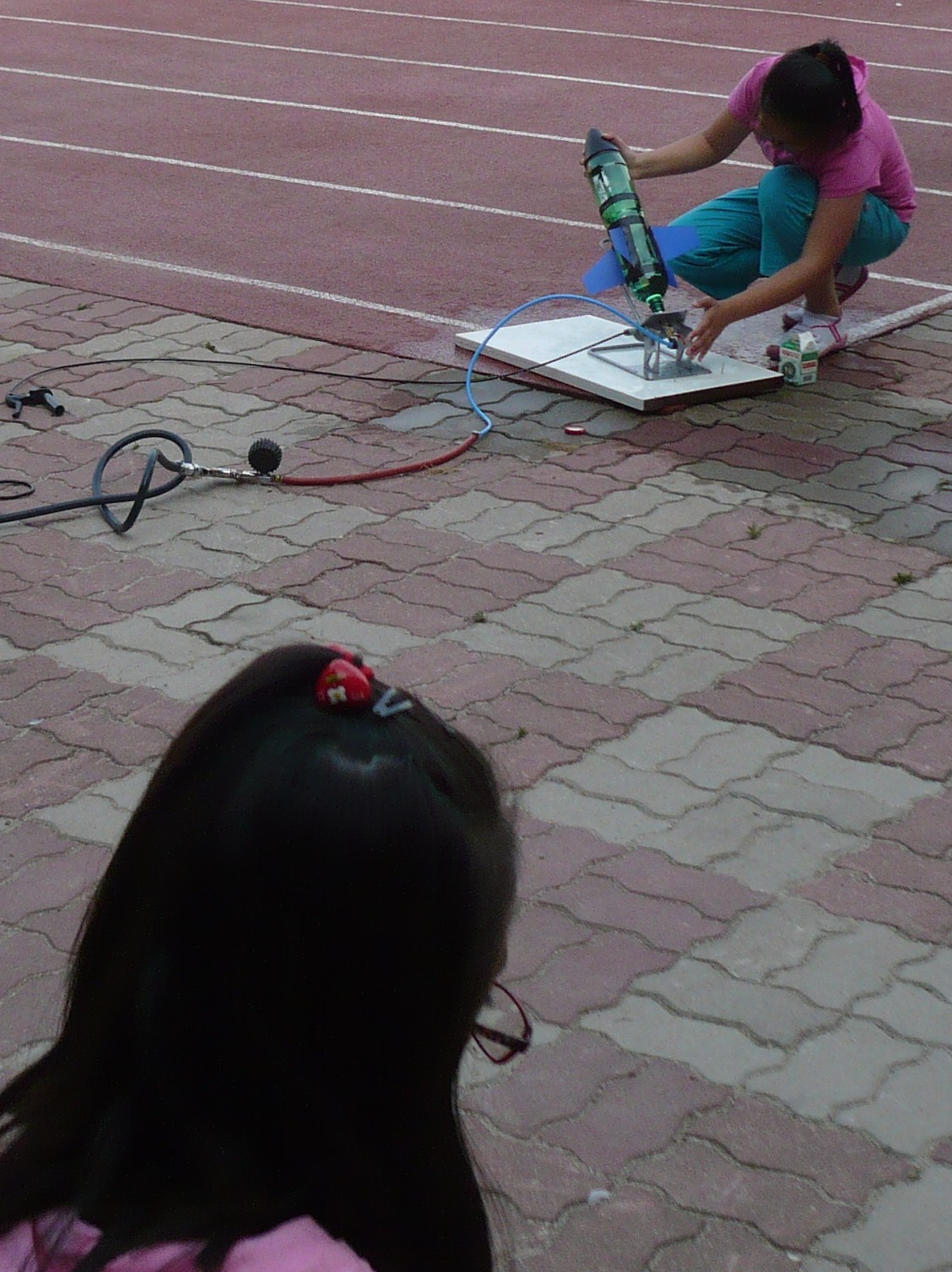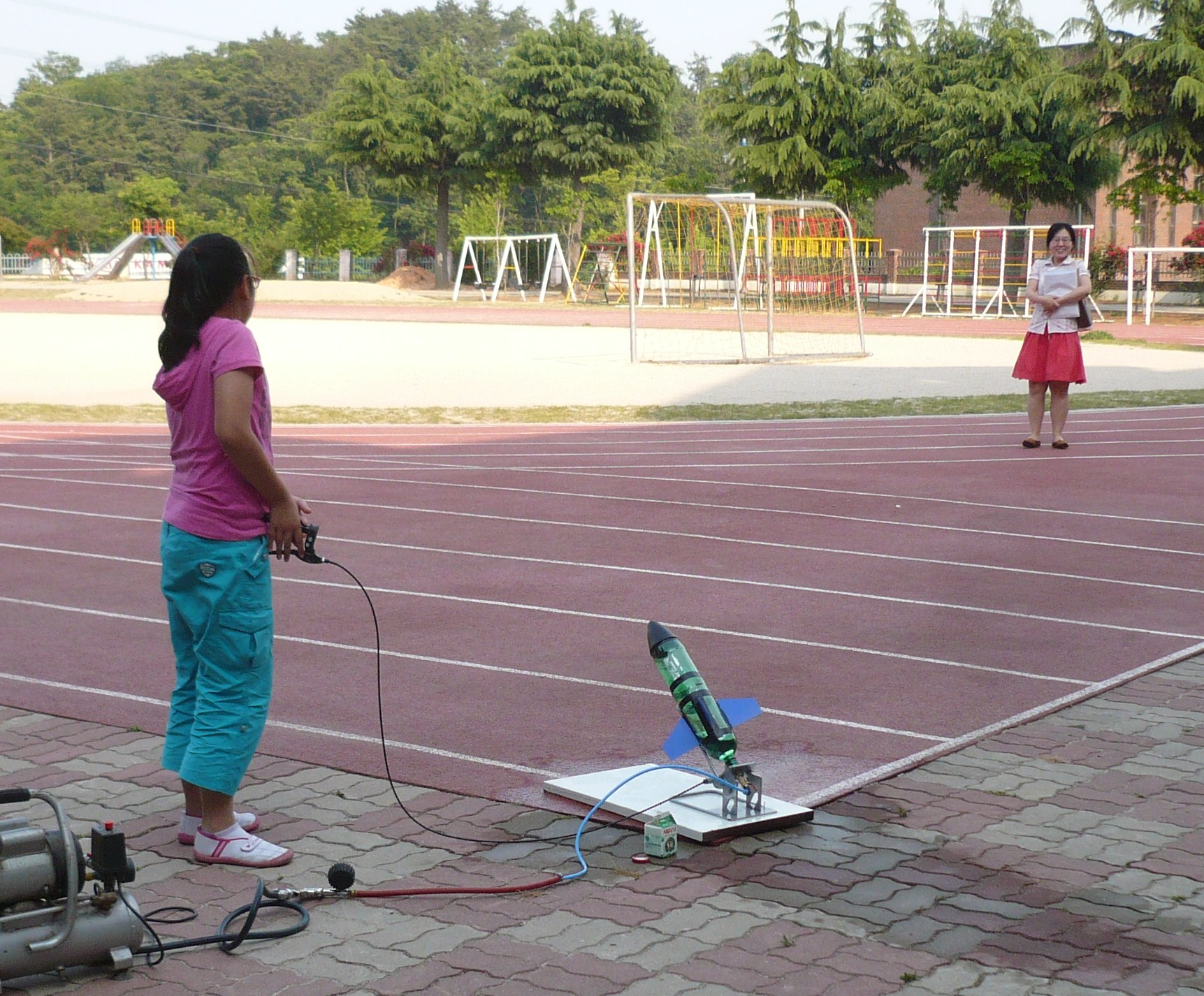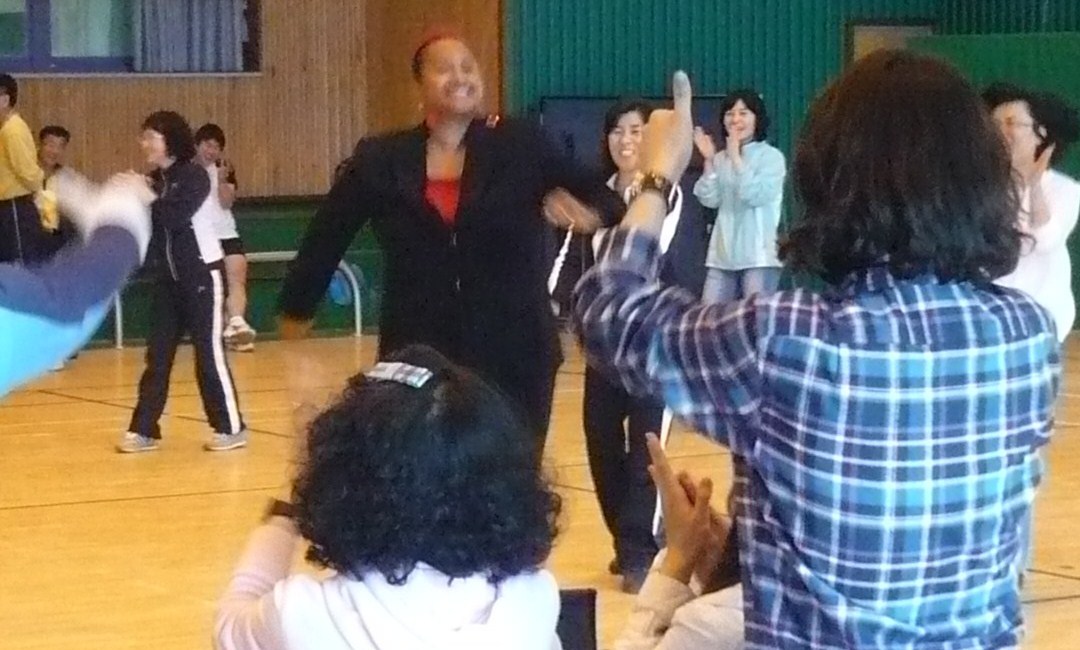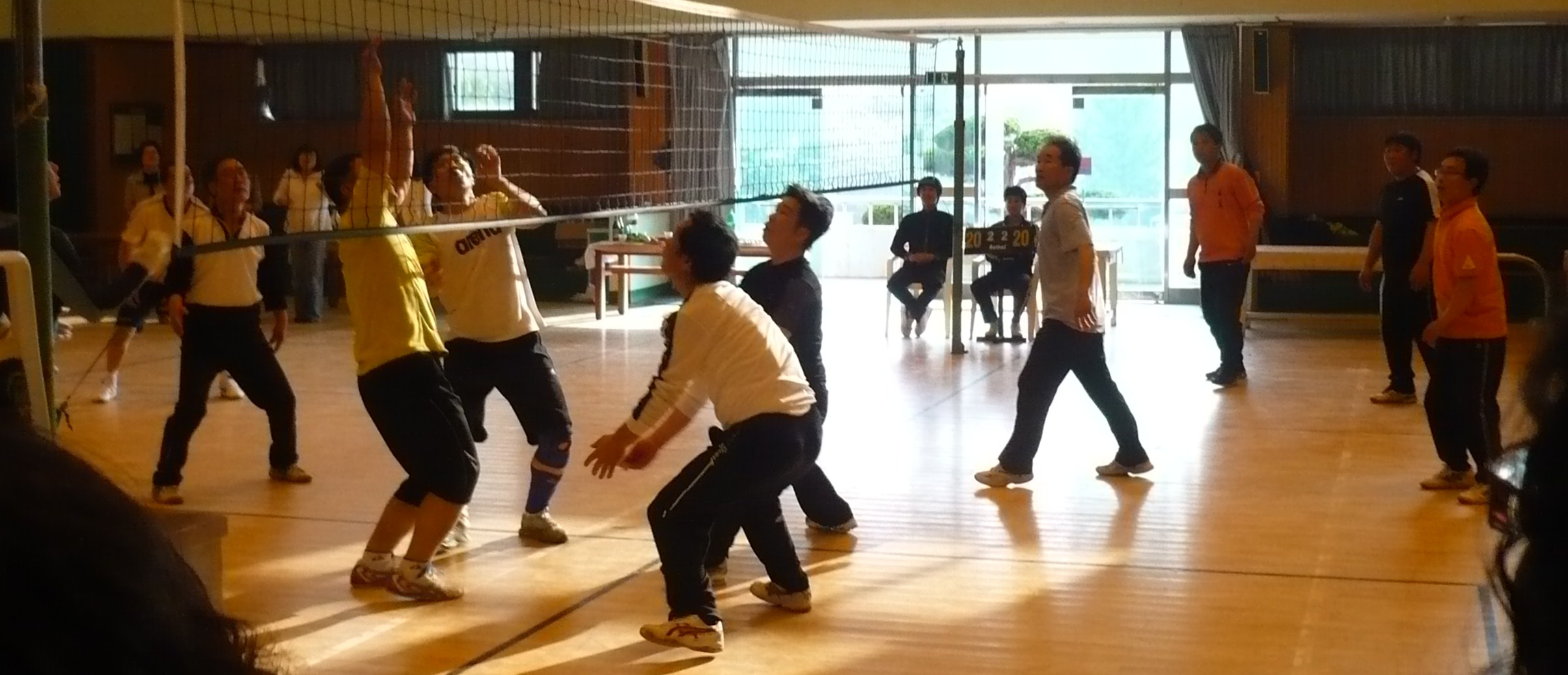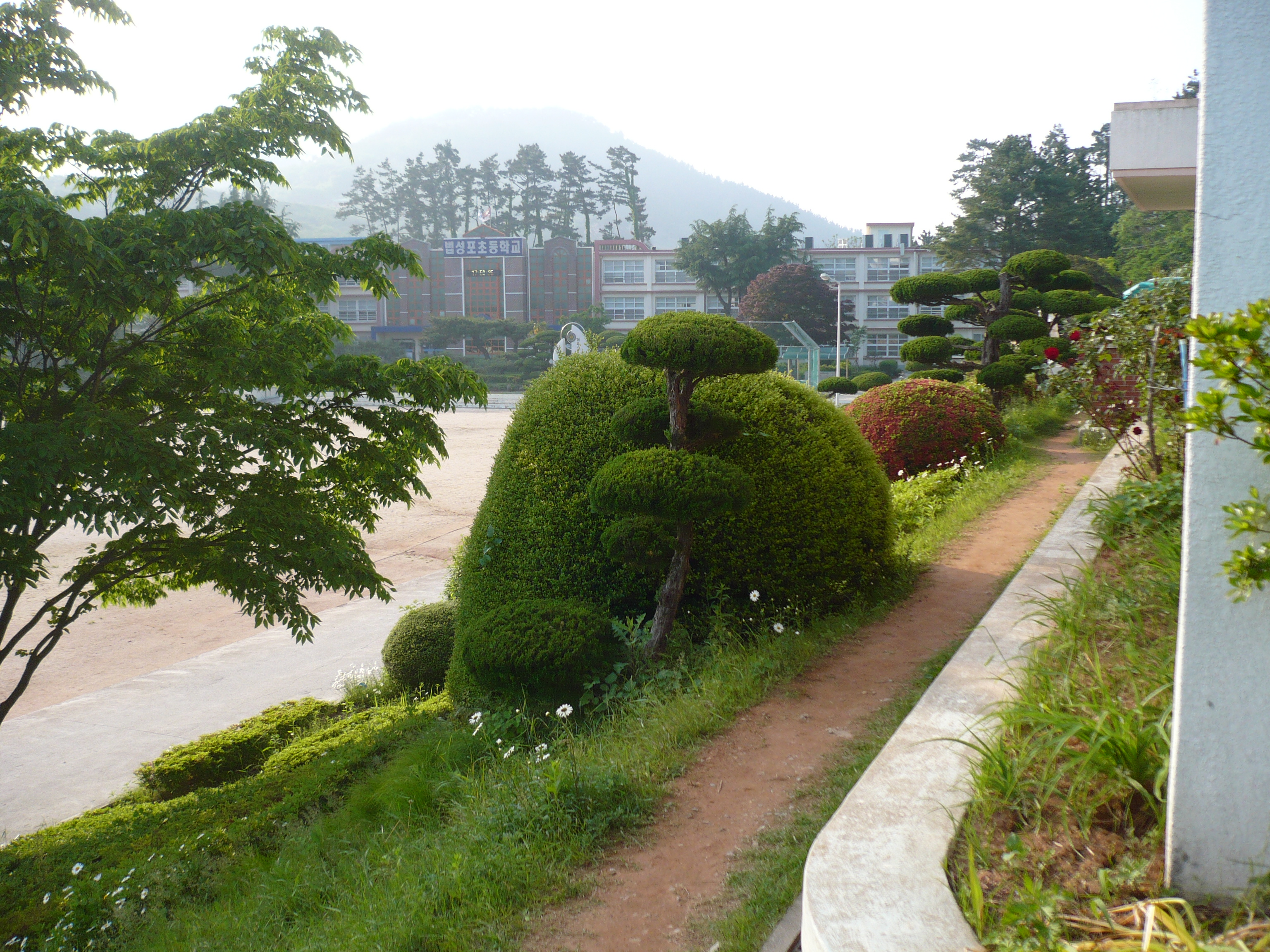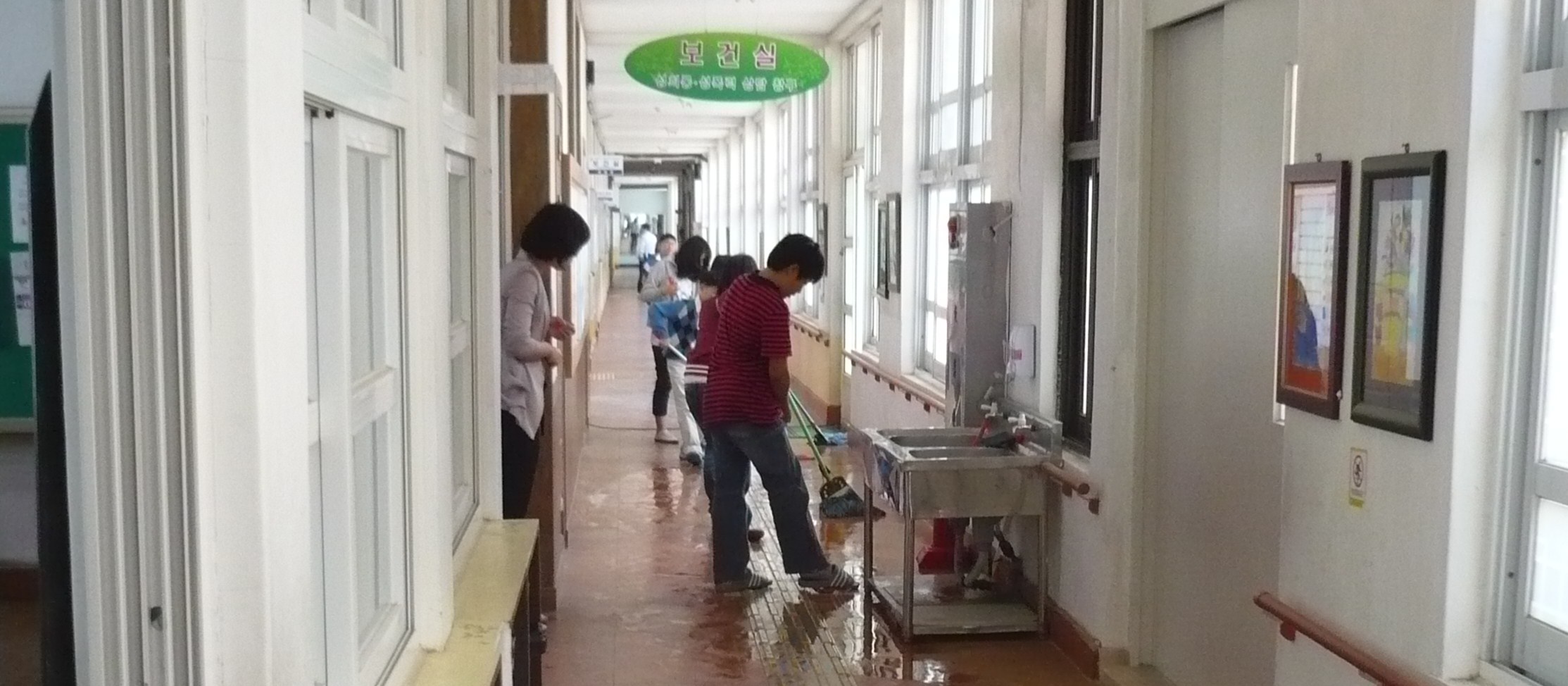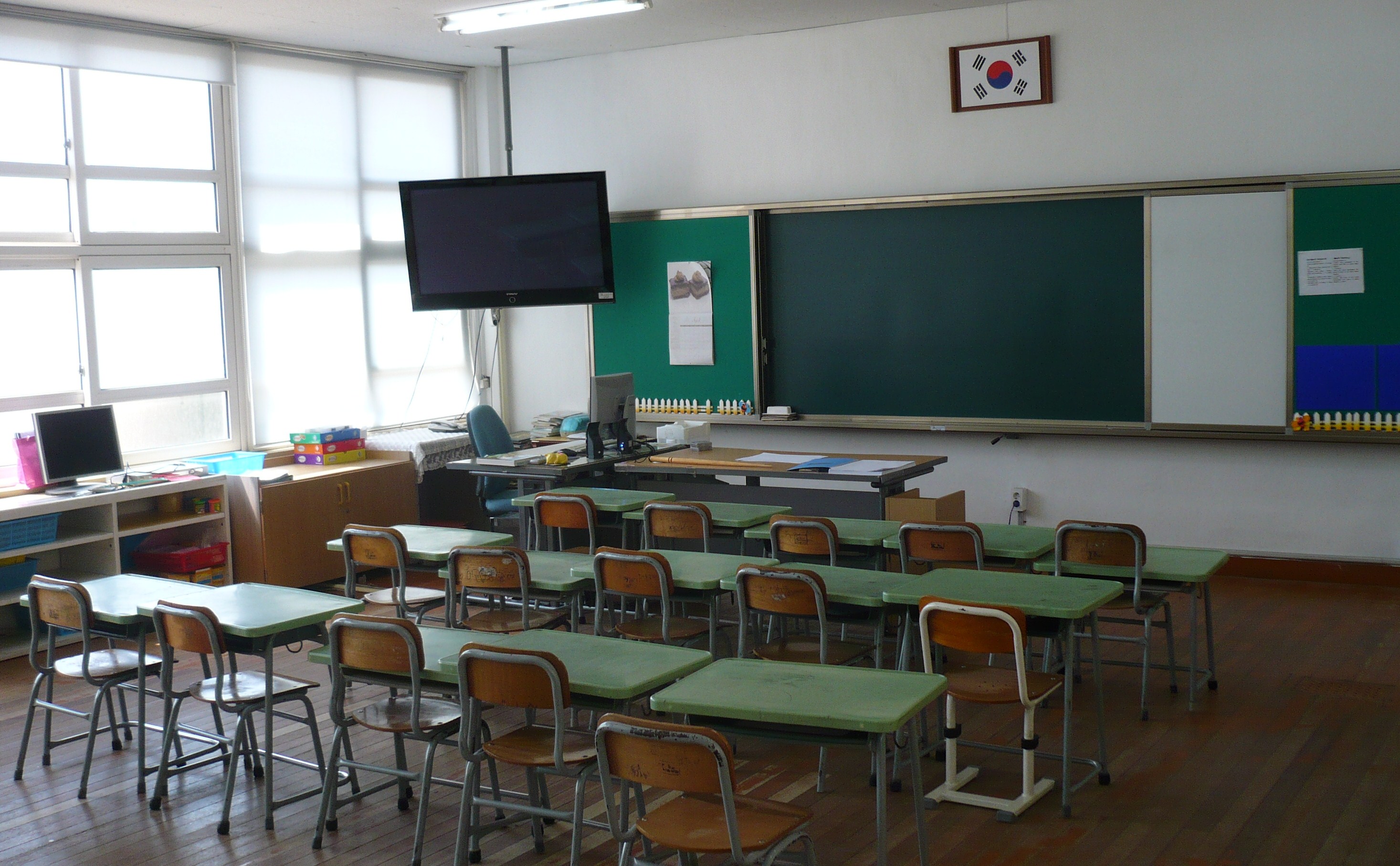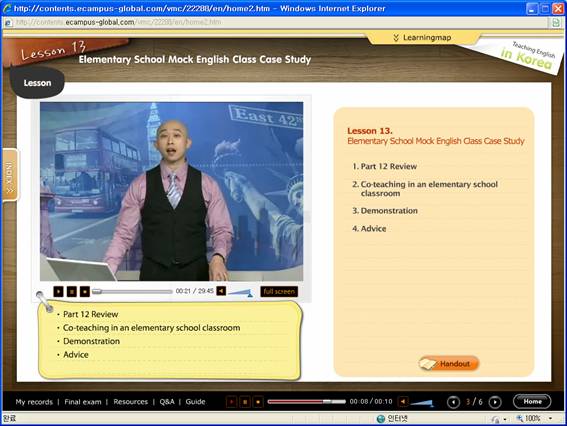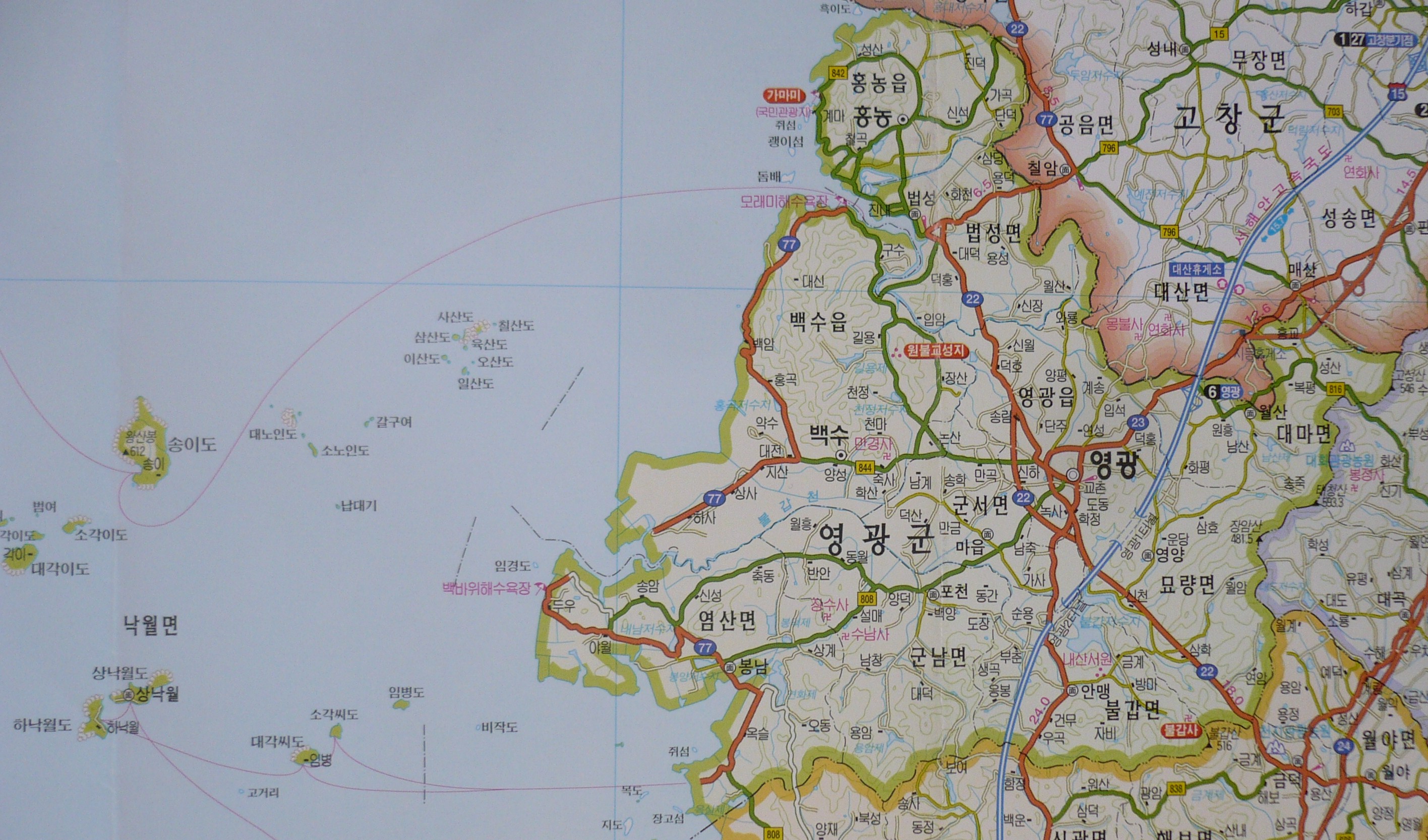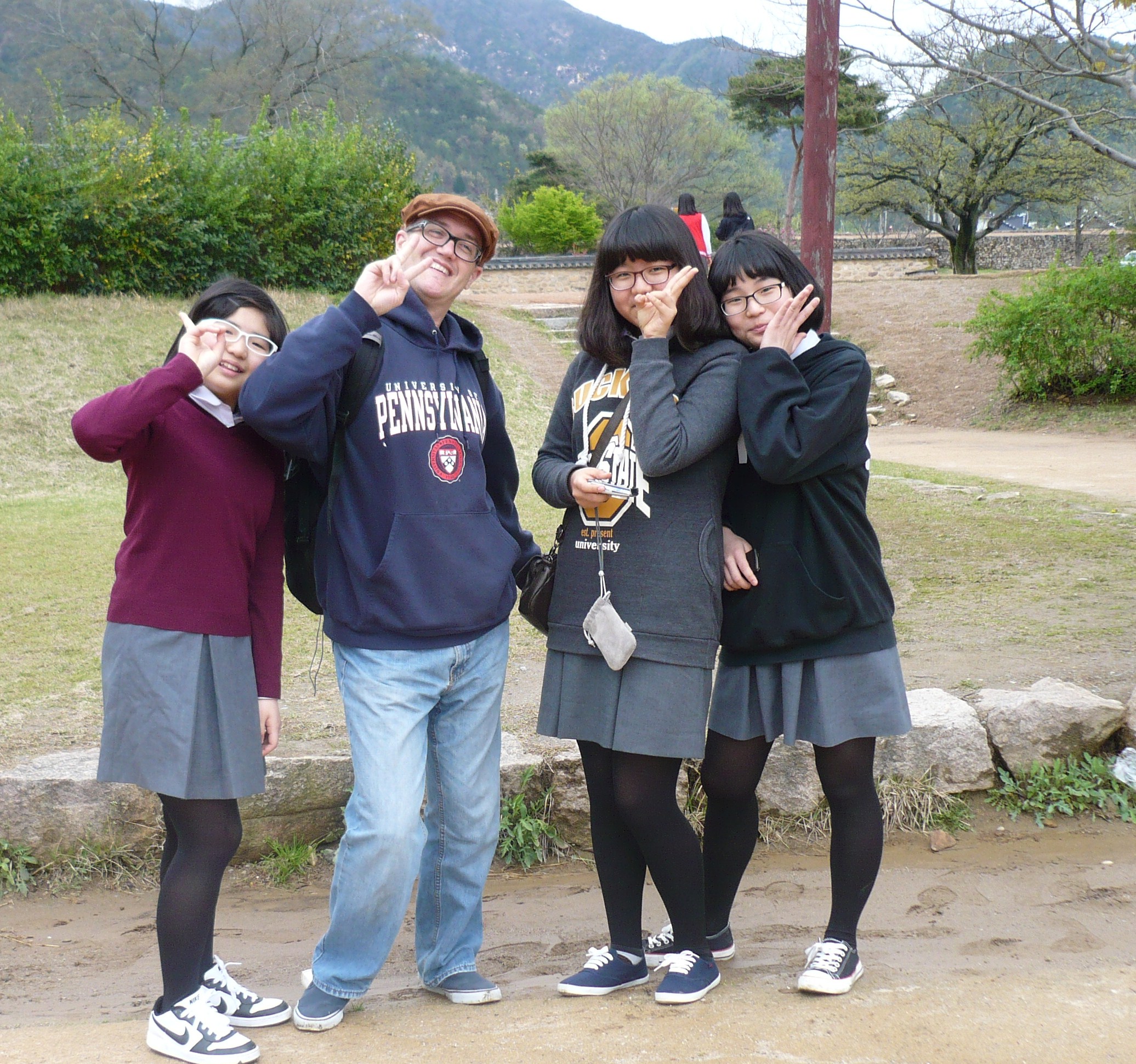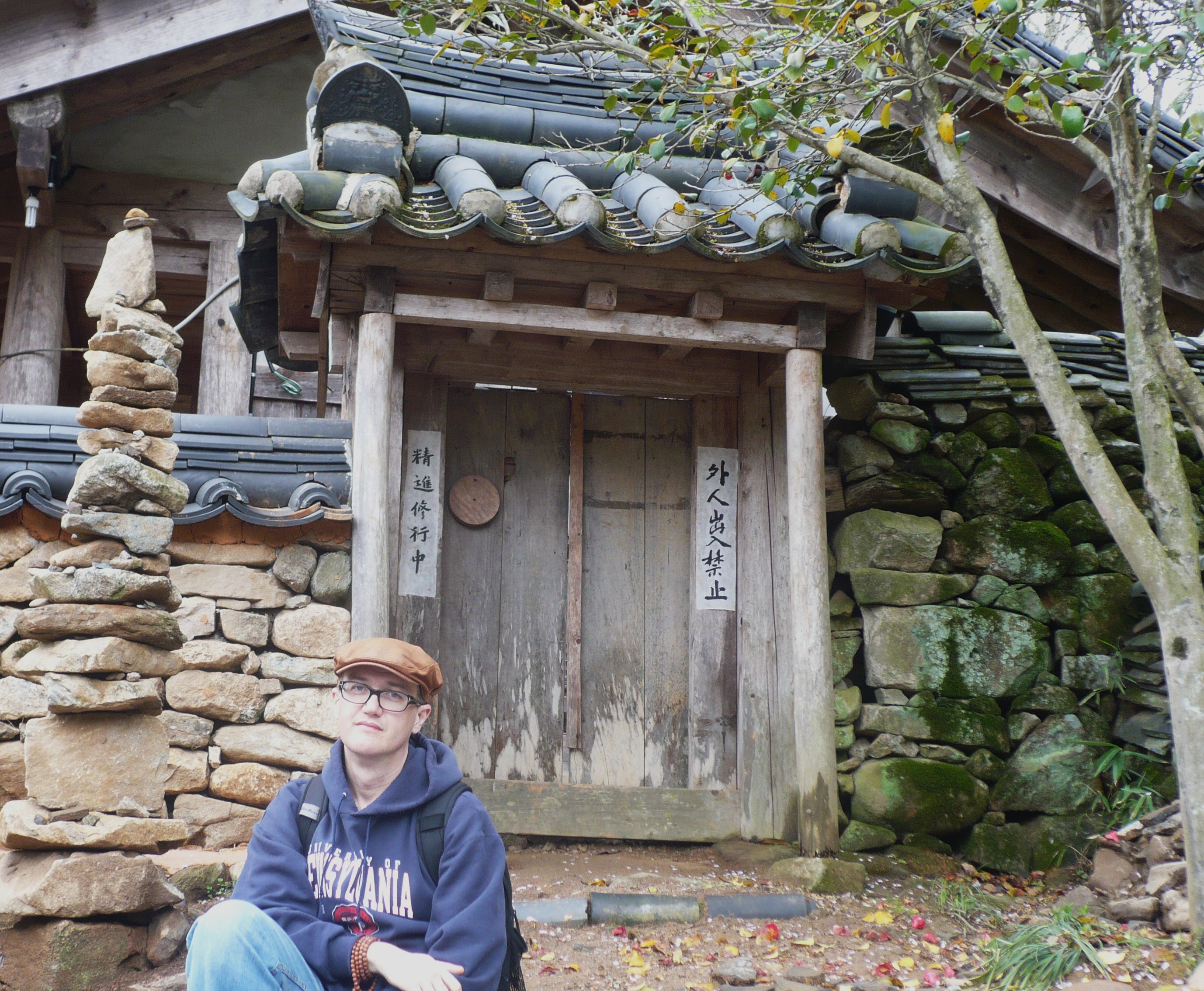I'm in Daejeon with my coworkers. The whole school staff piles into a bus, the moment the kids have left campus for the start of summer vacation earlier today. We drive to Daedunsan (Muju), the more ambitious hike some trails (I'll post some cellphone pics later), we drive to Daejeon, and have a hweh-sik with way too much beer, soju and makkeolli flowing. Now I'm in a hotel, and my roommates, being high on the seniority list, have been socially obligated to go drink some more. I've bowed out. Tired, and, as many know, I don't enjoy drinking too much. I'm feeling deeply melancholy as it is. I don't need more.
Category: The Wonders of Work
Caveat: 여름방학
Today is supposedly the last day of school before summer vacation (여름방학). Summer vacation for students, that is. And many (if not most) students will be attending summer camps and hagwon for most of the summer – that's the Korean way. I will be teaching school-run summer classes for the month of August, and I will get next week off. But I have to continue coming to work this week, as there are many things going on for staff at Hongnong Elementary. Sometimes it seems a little pointless to have to stay, despite the fact that most of the staff goings-on aren't relevant to a non-Korean-speaking foreigner.
But I'm not sure I really agree with those who vilify the "desk warming" phenomenon. It's what you make of it. Most of the staff in a school during these desk-warming days are quite busy: making plans, rearranging classrooms, preparing presentations for the school talent night, etc. If one chooses to take the time to interact with these people, and offer to help, you can build a lot of goodwill and it can be a learning experience, too.
Yesterday, I had only one regular class (the others were "cancelled"). And I did a little desk-warming, I admit – surfing blogs on the internet. But I also spent some highly productive time developing lesson plans for one of my summer classes, along with the person I'll be co-teaching it with. And I accompanied one of the third grade teachers with her class to the gym for a highly entertaining PE class, where I kind of had the role of observer / English-speaking kibitzer. And on Monday, I had my morning classes canceled and the kids for my first grade afternoon class didn't show up, but I was very busy developing detailed program plans for my other summer classes (for which I won't have a co-teacher). I was working "above and beyond" as they say, making more detailed plans than requested.
Nothing is more effective in building goodwill among unpredictable Korean administrators than unexpected displays of competence and dedication, in my experience. Actually, that applies to more-or-less competent administrators anywhere. Korean administrators aren't incompetent – they're just different. They're operating by different cultural rules, that for them and their underlings are largely transparent. These rules are only opaque and seem crazy to us Westerners because we haven't grown up within them.
Caveat: 배구
Caveat: Perseverance Predicted
I sometimes look at tarot cards.
 It’s not that I believe that they’re predictive. I’m dedicatedly anti-spiritualist; I’m deeply anti-transcendentalist. I don’t believe in any kind of magic, I don’t believe anything supernatural, religious or otherwise. Nevertheless, I’ve always been fascinated by tarot cards. They are symbolically “loaded” and full of interesting interpretative possibilities. In field of semiotics, they might be termed “hypersignifiers.” I guess I view them as a sort of self-administered Rohrsach test, when I lay them out.
It’s not that I believe that they’re predictive. I’m dedicatedly anti-spiritualist; I’m deeply anti-transcendentalist. I don’t believe in any kind of magic, I don’t believe anything supernatural, religious or otherwise. Nevertheless, I’ve always been fascinated by tarot cards. They are symbolically “loaded” and full of interesting interpretative possibilities. In field of semiotics, they might be termed “hypersignifiers.” I guess I view them as a sort of self-administered Rohrsach test, when I lay them out.
Anyway, this morning, I laid out three cards. Recent past, present moment, upcoming near-term future. The meanings of the “past” and “present” cards were unremarkable: ambiguous and uninteresting to me. But the “future” card was striking… in its irrelevance. It was the nine of wands. The interpretative meanings are:
Perseverance — Persisting despite all setbacks and against all odds
Having the hidden reserves to prevail, to defend what is yours
Boundary issues, being defensive
Defining your “space”
“That which doesn’t kill me makes me stronger.”
I distinctly remember thinking: that doesn’t seem to apply to my near future. The recent past, maybe. But just now, I feel as if I’ve reached a kind of equilibrium with respect to my living situation and work, finally. I’ve been settling in. I thought: something would have to get much more messed up for that kind of near-term future to be meaningful or important.
But by the end of the day, today, I was muttering “perseverance, perseverance” to myself. Yes, things felt messed up at school, today. Not for me, directly – but I was witness to some majorly messed-up personnel management (which in-and-of-itself is no surprise in a Korean workplace, admittedly). I won’t describe it in detail – it’s an ongoing crisis, and not really my business, and involves people who probably know about this blog, too. Maybe I’ll discuss details later.
For some reason, I have a really hard time watching other people being treated badly in their work. Even when they somewhat deserve it or have brought upon themselves, as I’m certain is the case, here. But the situation still reeks of injustice and inhumane management. And hypocrisy – that always bugs me. And I have to deal with feeling caught in the middle. I don’t want to hear about it. I don’t have a solution that anyone appreciates or even wants to hear. I don’t want to have to watch it play out in slow motion in the staff room beside me. It makes my life unpleasant. So the rest of it checks out as well. Example: boundary issues – why am I being drawn into this? Why do I have to watch and comment on this?
OK. I still don’t believe tarot are predictive. But, it was a day with interesting psychological resonances. I’m just going to sit by, and try to keep my face looking like the guy in the picture, above.
Caveat: Korea… contingent chaos, constant quasi catastrophe
Today was one of those chaotic days. Yet I feel OK about it. It's weird how some things affect me, and other things, that seem to so profoundly affect others around me, slide over me with barely an impact. Some types of chaos I can handle, others I can't.
Today they decided to announce that they were going to start remodeling the language classrooms – immediately. That meant we had to move to a different place, a kind of supplementary staff room, and teach our after-school classes in a who-knows-where location.
I wish I had taken pictures of the parade of children helping move all the stuff from the language classrooms. It all seemed very communitarian.
Well anyway. Such is Korea. Sometimes, given how institutions and groups make and execute decisions, it's puzzling to me how they've been so successful
Caveat: Gray overcast days
Summer has arrived in Korea: humid, warm weather, with clouds and constant promises of rain. I'm using my weekend-time very efficiently. Not.
Having had a difficult day on Friday left me carrying around some negativity about my work – or, more specifically, feelings of negativity about my compentency at my work. I refuse to scapegoat my shortcomings as a foreign English teacher in a Korean school on perceived inadequacies in how Koreans have opted to run their education system, which is the easy course that so many of my colleagues teaching in Korea seem to have taken. Then again, the most unappealing thing I could pursue here in this blog is to carry on in a negative way about other people's negativity.
Sigh.
Caveat: Anosognosia
Thinking about Rumsfeldian unknown unknowns. What are they? I was contriving a paradox: the epistemologist who didn't know he was one.
I'm still weirdly obsessed with the McChrystal drama. By accepting his resignation, has Obama created a MacArther-type monster, that will be a martyr and icon for the tea partiers? Isn't that dangerous? Or… has a back-room deal been cut, that will grant McChrystal some new role after an appropriate cooling-off period? I understand the chain-of-command / civilian-control argument that said "McChrystal must go," but I think this was a very risky move for Obama politically. Was there a better solution, though?
Yesterday, the staff volleyball game wasn't played – most of the teachers were all working hard preparing for some sort of inspection / observation / review that seems to be coming up. I'm not clear on the details of this. On the one hand, staff volleyball stresses me out, because I'm really very bad at volleyball, and it's mildly humiliating. On the other hand, I look forward to it because I actually understand that it is valuable in building a sense of colleague-ship and community with the Korean teachers, which is what it's "for," obviously.
As a foreign teacher, it's so easy to feel isolated and cut-off from everyone, and one thing I find myself shocked to be missing about LBridge is the "staff room" – I used to dread the staff room! But it did give me a chance to sort of gauge the "mood" of everyone, over time, whereas here, because I have my own classroom to lurk in, I'm quite isolated.
Caveat: Sleeping through Higuain’s Hat-trick
I’m definitely a little bit sick. I was going to watch the World Cup match between Argentina and South Korea last night, and ended up falling asleep before it even started. What’s with that? I basically slept straight through – I almost never can sleep 11 hours like that – I can barely make 7 hours normally, these days.
Anyway, I see that Argentina beat South Korea. Which is what I expected, though I was hoping SK could hold down the Argentinians a bit. No such luck – Higuain pulled a hat trick, no less. Ah well. SK could still make it out to the elimination round… as the runner-up team from their group – if they can beat Nigeria.
I did an upload from my camera. Here are some random pictures from recent life.
First, this is the bulletin board at the back of class – I’ve put up a bunch of pictures from my first graders. They were supposed to draw a fixed number of animals of their choice (practicing numbers and vocabulary for animals). Some caught on to the concept better than others. There’s some good drawings for that age group, though.
The next picture is the view from sitting at my desk in my classroom, looking out the door to the hallway and the courtyard beyond, where some workmen have parked a push-cart temporarily. The afternoon scene struck me as somehow picturesque and idyllic, right then, so I snapped a picture.
This is a picture of a second grade Korean Language Arts reader that I found in my classroom. I’m trying to read it, but it’s too difficult for me. It keeps me practicing, anyway.
This last picture is from yesterday afternoon, when I accompanied some coworkers out to where the fifth graders are having an overnight camping excursion (near Bulgapsa, at the other end of Yeonggwang county from where Hongnong is). I didn’t get to interact with the kids much, but I got to sit and listen to some of the teachers shoot the breeze with our vice principal and the local groundskeeper over beer and watermelon, while the kids were doing various activities with other teachers. The picture shows the kids finishing setting up their tents. The whole thing has a bit of a military air to it, which is exactly what I would imagine for a school camping trip in Korea. But I’m betting most of them are nevertheless having a blast.
Caveat: Pet Pop Star
We were in the 4th grade class. We were practicing the following simple dialogue pattern: “Who is he/she?” “He/she is ___. He/she is my ___.” For example: “Who is she?” “She is Mary. She is my sister.”
My co-teacher has put up some possible “people” and some possible “relations”: for the “people,” there were pictures of various famous people or characters the kids were sure to know the names of, including Einstein, Hermione (as in the Harry Potter character), and others; for the “relations,” she provided “aunt” “uncle” “brother” and “sister.”
So there is a 4th grade girl who has the English name of Hannah. The teacher pointed at the picture of 정지훈 (Jeong Ji-hun), a Korean pop star and actor who sings under the pseudonym of “Rain” but also uses his real name for action movies. He’s considered quite handsome in Korea. The girl’s English is excellent – probably the best in the class.
The teacher asked, “Who is he?”
Hannah said, unhesitatingly, “He is Jeong Ji-hun. He is my pet.”
Caveat: 외계인들은 홍농에 왔어요
Caveat: 3, 2, 1…
There were some kids doing science outside on the track/soccerfield/gathering area, with some supervision – although less supervision than would be found for similar activity in a US school. They were launching water and air pressure powered plastic bottles made into rockets. The idea was to see how far and how close to a target at the other end of the field they could get to.
I think they’re going to a science fair at Naju, tomorrow, based on overheard conversations (my ability to figure out what’s going on from overheard conversations continues to improve, but still leaves a lot to be desired – it still requires a lot of context). Here’s the last girl of the evening, launching her rocket – after it occurred to me to take pictures. It flew pretty far, but wasn’t that close to the target.
Korea postponed the launch of its rocket, Naro-II, which, if successful, will be the first successful launch-to-orbit of a satelite by the Korean Space Program from Korea’s new space launch facility. It was supposed to take off yesterday evening around 6 pm, from the Naro space center which is at the southern end of Jeollanam Province. They had an unsuccessful attempt last year (Naro-I). They’re using a combination of Russian heavy-lift rocket technology and home-grown control and satellite vehicle (so, the bottom stage is Russian, the top stage is Korean).
Caveat: 말이 많으면 쓸말이 적다
There are some workmen doing work on the “staff” bathrooms that I had been in the habit of using. Actually I have no idea if they’re officially “staff” bathrooms, but they’re across from the Principal’s office so I that what I think of them as. Anyway, because of that, I started using the bathroom across the little courtyard to the west of my classroom. Why am I telling you this, you might be wondering?
In this bathroom, someone has posted little Korean aphorisms and proverbs over each urinal. So while I use the urinal, I get a Korean language lesson – if I can sort out the vocabulary. I try to choose different urinals, to get some variety.
The above aphorism (말이 많으면 쓸말이 적다 = mal-i manh-eu-myeon sseul-mal-i jeok-da) seemed to make sense – the only word that puzzled me was “쓸” but I guessed it meant “wise,” which would give the meaning of the phrase as “there are many words but few wise ones” which makes sense. But it turns out (according to my coteacher) that it means “will-be-used” (roughly). That gives “there are many words but few that will be used.” I don’t understand this quite as well, but it’s not impossible.
Yesterday, I had a sudden “aha!” moment in thinking about serial verbs in Korean. Serial verbs are where several different verbs get strung together, each with a finite ending, with only the last bearing all the extra endings (marking politeness, etc.). A simple example would be “공부해 봤어요” (gong-bu-hae bwass-eo-yo = I tried to study). I suddenly thought that maybe these serial verbs are the Korean language analogue of periphrastic verbs in English (periphrastics are also sometimes called two-part verbs, like “get up” “get down” “get in” “get out” etc.), not syntactically (obviously), but definitely in terms of what you might term “semantic pragmatics” – they’re what the language turns to when it needs a new meaning. I’ll think about this.
In other news: I am learning a lot from my coteachers. Ms Ryu, with whom I teach the 3rd graders, is a very patient and kind teacher, and she has an amazing focus on positivity and the kids behave amazingly well for her. I need to learn to emulate her tricks and style. She spends a lot of time explaining to the kids what will happen. This is not a trick I can use effectively, given I’m supposed to be speaking English and that my Korean is so bad that I doubt I could get my ideas across very well anyway. But it does underscore the importance of being consistent and predictable, which is something I CAN do, and which helps the kids to know what will happen. She always writes what the lesson objective will be, on the board, and sometimes even has the students read it. I could do this, in English, too. [e.g. “Students learn to say: I like __ / I don’t like __”]
My other coteacher (the “main” one), Ms Lee, with whom I teach the fourth graders, is generally quite focused on keeping things “fun,” and she is a more kid-centered, western-style teacher. The consequence, with Korean kids, is that there are more moments when the classroom seems out of control, but I think if you can tolerate this state of affairs, it can be good for learning, too. It’s a fine line between “seems out of control” and “really is out of control.”
Caveat: The Karmic Consequences of Complaints?
I don't dare complain to anyone about my new apartment – each time something has gone wrong, and I've said something negative about my apartment, the next apartment is worse, in some way.
It's easy to feel like someone in the administrative office hates me. It certainly leaves me feeling unwelcome and unliked. But… I really think they have no idea how this whole process has impacted my feelings. Koreans, in general, don't think about the feelings of others (especially "outsiders") the same way that many in the "West" seem to. And, I think it's possible that they have tended to interpret my complaints about my various apartments as "calls to action," when, in fact, I'm really mostly merely venting my feelings.
Anyway… so what's the new apartment like? It's very small. Smaller, even, than my apartment in Ilsan, by maybe several dozen square feet. But it's very clean. That's the positive. And the smallness doesn't actually bother me, although I admit I'm still missing that first place I was in in Yeonggwang, which, despite it's filth, was roomy and quirky. This new place is just a "box in a building" – but it's clean, and has an A/C unit (which I know I'll appreciate come the dog days of Korean high summer).
My biggest complaint about the new place is: the missing "extras" – many of those things that have been "standard furnishings" in each of my Korean apartments up until now. There is no washing machine (I'm supposed to use a public one in the lobby of my building – I don't see this happening very often, as it seems both inconvenient and fraught with communication difficulties vis-a-vis the other residents and the building manager), there is no microwave (my place in Ilsan had no microwave, but it did come with a toaster oven that functioned as an adequate substitute), there are no broom, trash can, toilet brush, or cleaning supplies of any kind (good thing it's clean, but, it means I'll have to invest in these things, which is a little bit annoying), there is no desk or chair (but the place is so small that I allowed the guys moving me in to convince me there was no point in getting a desk or chair – where would a desk and chair go?), there was no bedding (admittedly, they could see I had my own – that I had bought for my first place, because the stuff given to me at that place was too filthy to use), there were no kitchen dishes of any kind (again, they knew I had some of my own – but my set is incomplete and I'd been relying on things like a fry pan, bowl, etc., being provided).
OK… this is just more venting, right? I'm going to try very, very hard not to complain to the people who put me here, because at the rate things are going, if I do, next they'll stick me in a closet or a barley field somewhere with some chickens.
Caveat: Staff Volleyball
We had staff volleyball yesterday afternoon. It typically happens on Wednesday afternoons, if it’s going to happen. This time, instead of it being “intramural,” Hongnong Elementary (my school) was playing against Beopseong Elementary (the next school down the road), and so we all piled into various vehicles at around 3 pm and drove over to Beopseong. I thought I would have to play. But they were taking the competition with the other school too seriously, and they had already seen that I wasn’t really very good at volleyball, so, as the game against the other school progressed, it became evident that I wouldn’t be invited to play. I just sat and watched.
First, there were a couple women’s games (female staff vs female staff), and Hongnong won those games. My fellow foreign teacher (who I got to know because she went through orientation training with me at Gwangju last month) played for her school’s team, and really did quite well (better than I have done so far, anyway).
Then it was time for the men’s games. They played three games, and after Beopseong won 2, that meant there was a tie between the schools, 2 games to 2, because Hongnong had won the women’s and Beopseong had won the men’s.
The final game was quite suspenseful, and, honestly, some of the most entertaining volleyball I’ve ever watched. I didn’t resent not being allowed to play – I probably would have messed up. The last game came down to 20 points vs 20 points. There were a lot of amazing volleys, too. And finally, Hongnong won, 22 to 20. The pictures aren’t that good, but here are a few.
First, the women’s game – you can see my colleague Donna, who teaches at Beopseong, looking victorious after a winning a point.
This is the last men’s game, during a long volley after the game was tied 20-20. That’s our vice-principal looking appropriately dynamic in the white shirt in the foreground.
This is a picture of the Beopseong campus.
[this is a “back-post” added 2010-05-29]
Caveat: More Alligators For All
Yesterday with some of the afterschool kids (I don’t have an afterschool class on Thursday, but my co-teacher and fellow foreign teacher Casi have one) were playing with the green plastic alligators. They were having a lot of fun. Here is a picture.
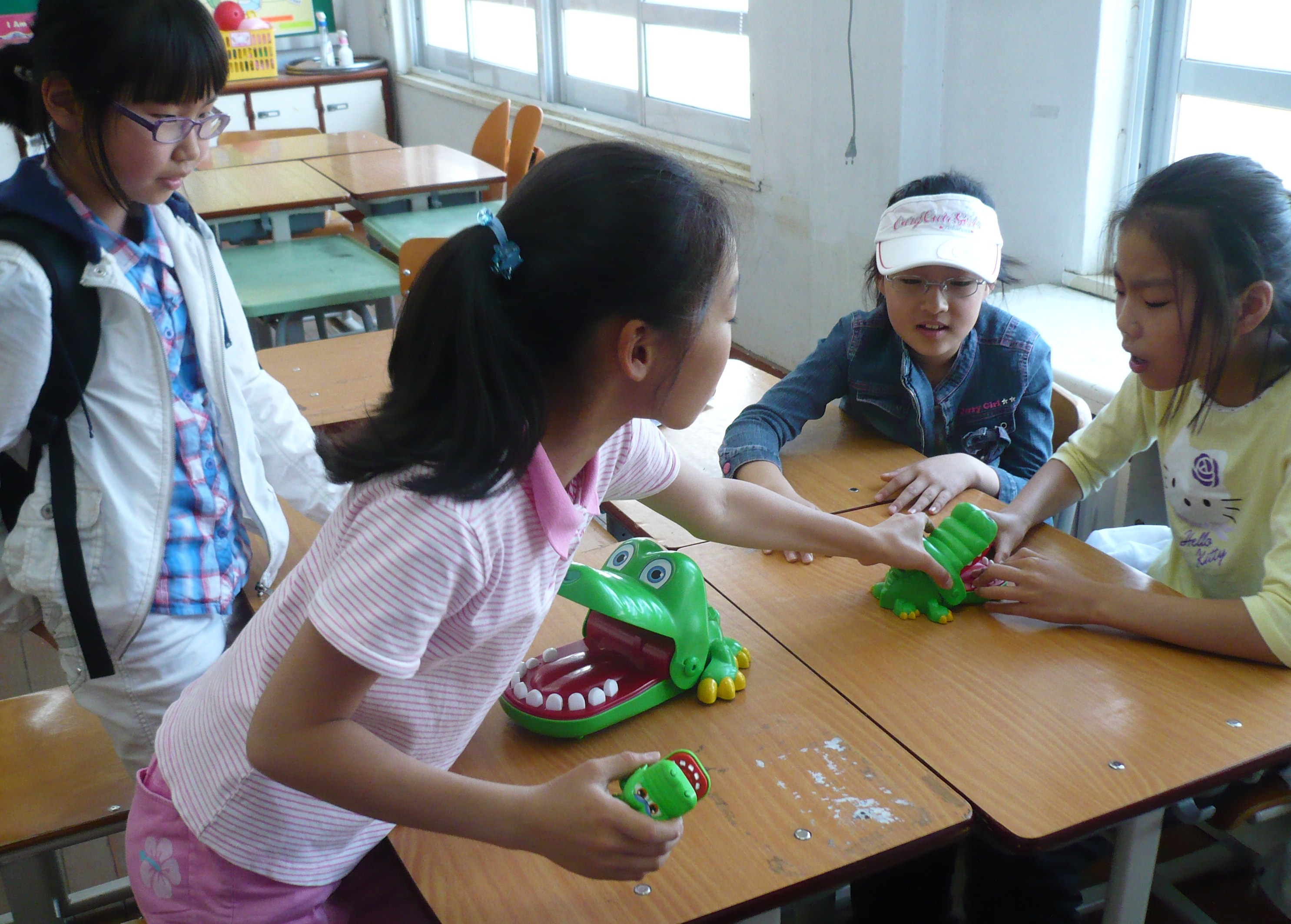
Here is a picture of one of my first-graders, Haneul, who insisted I needed to take a picture of her.
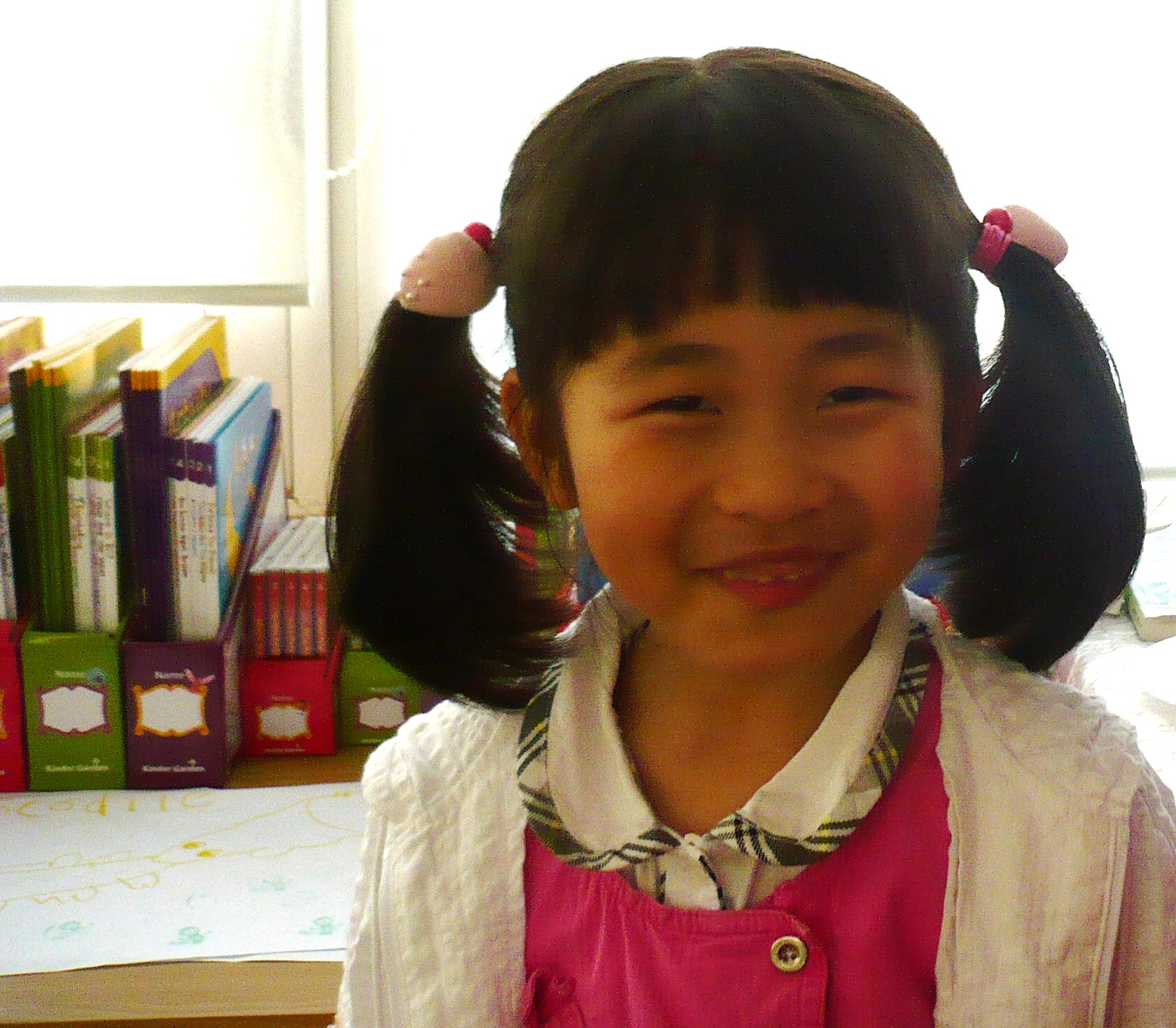
Today is Buddha’s Birthday, a national holiday. Casi and I walked over to that Baekje Buddhism monument this morning (appropriate, right?). Here is a picture of an unexpectedly ascetic-looking Buddha that we saw there – see his ribs, showing?

Now I’m in Gwangju, where I found a place with FAST free internet wi-fi. I’m fixing and updating my blog.
Caveat: Metaphors for a Micromanaged Homelife
At the risk of annoying my loyal and not-so-loyal readers with my ongoing negativity RE my living situation, I'm going to rant some more.
I guess that's what there is to do, given the isolation I'm feeling, sitting in my gloomy, depressing, temporary apartment, internetless and out-of-control.
In order to cope with, specifically, that last element – the feeling of being out-of-control – I let my mind wander to past experiences and fantasies that capture my current experience. I have been obsessing on 4 metaphors.
1) The Army. I served in the US Army in 1990~92, including training in South Carolina and "permanent station" here in Korea (up by the DMZ). The feeling of having no control over where I'm staying, over what's going to happen next with where I'm sleeping, of having my personal life micromanaged – these feelings are something I haven't experienced with such intensity since my Army experience.
2) Prison. I have never been to prison. But I found myself sitting in my little apartment, and coping with my current feelings of frustration by thinking: "this could be prison. As prison, it's not so bad. I can go out and take a walk. I can cook something for myself. I can watch TV. If I'm feeling obsessive, I can kill time by scrubbing the vast quantities of mold in the shower, or by sweeping up the previous occupant's copious stray pubic hairs, to be found in every nook and cranny. Life isn't so bad."
3) Foucault's Panopticon. Related to the prison idea: the French philosopher, Michel Foucault, conceptualized a sort of "ultimate dystopian prison" wherein everyone was constantly being watched, monitored, disciplined. A glass prison. I think of this specifically because my current temporary space has a giant picture window facing the school itself, across a gap of maybe 10 meters. There are no drapes or curtains – and I don't really see how I could justify finding some, given this is, supposedly, temporary – it'll be over in a couple of weeks, right? My coworkers, if they're lurking in the school in the evening, can sit and watch the "foreigner" – what is he doing? Oh… he's watching TV. Oh… he's pacing. Oh… he's picking his nose. Oh… he's cooking something. Wow… he's eating kimchi. Weird foreigner.
4) The Zoo. All foreigners in Korea can sometimes feel like a zoo animal. The above-described "panopticon" feeling contributes to this further. I feel as if I'm constantly being watched, and sometimes it feels like it's strictly for the amusement of those around me. I realized that in actuality, most of these people aren't even aware of me. Koreans, typically (and I hate to stereotype too much), don't really pay attention to their surroundings much. Perhaps no one has even realized that the "foreigner show" is on, in the window across the way. But if they do realize, then surely their curiosity will get the better of them, and they'll be watching me. When I was much younger, I tried writing a short story, in the science fiction genre, about a man who had been kidnapped by aliens and was being kept simply because he was interesting to watch. The story was a bit Kafkaesque: no real point; just living as a zoo animal, for the aliens. I think others have written stories like this, too, although I can't recall any specifics.
These are my metaphors. This is my mental space.
And yet… as you can see from my previous post, if I set these things aside, the work itself is going fine. I'm teaching well, and competently, and it's fun, too. The classroom has become a refuge. This is very similar to my darkest times when teaching at LBridge (hagwon). There, the darkness was caused by feelings of being overwhelmed by the offhanded, randomized and unpredictable nature of life in the staff-room. Here, the darkness is being caused by feeling of being overwhelmed by the offhanded, randomized and unpredictable nature of my housing situation. Not so dissimilar, eh? I'm suddenly wishing I had a much "fatter" schedule – if I had 40 or 50 classes, I could just bury myself in my work and I'd have zero time to meditate on my barracks/prison/panopticon/zoo.
Caveat: Kindergarteners
I finally had my first time with the "kindergarteners." Actually, the Korean term that is translated as kindergarten is 유치원 (yu-chi-won) and it really means any schooling below first grade – so the age range is from "barely out of diapers" right up to 6 or so (western counting). Many public elementary schools don't have kindergartens, but this one that I'm working at, because of the same extra funding that allows them to have two amazing and underappreciated native English teachers, also has a kindergarten wing. And on Wednesday mornings, barring other events, I get to teach the little ones.
I spend 30 minutes with each group: oldest, middle, and youngest. They were great fun. Kids that age are easy to teach language to, because they just sit and soak it up, like sponges. Half-an-hour a week won't get them fluent, but at least it gets them exposed to it, a little – kind of like the Spanish that American kids get so often in lower grades.
I showed them one of my famous plastic finger-chomping alligators (actually, it was my co-teacher's new alligator, who had bought a few after seeing how I used them in class and liking the idea). They were very, very focused. And we did the 코코코 game (ko-ko-ko means nose-nose-nose): you touch parts of your face, and name them, and then at some point you make an intentional mistake, like pointing at your ear and saying "nose." The kids think this is hilarious, and it helps them learn the vocabulary. You can apply it to other things too, like piles of toys in the shapes of food, or whatever. It's a pretty informal game, but those work best.
Finally, we read a story (there are some pretty good Korean-developed curricular materials that include custom-written stories, that I was given to use). Reading picture books to kids is great, you can stop and talk about what's going on in the story much more smoothly than when watching a video or listening to a CD. It becomes more INTERACTIVE, and can work at any level: "Where's the dog?" "On roof!" "Why?" "Hide."
Caveat: Worse than a hagwon job?
I was lying awake last night, overwhelmed and frustrated. Why am I taking this so hard?
I think I always tend to view my "home" (wherever it is and such as it is) as a refuge from whatever frustrations I'm dealing with in life. So having the "home" situation BE the frustrating situation that I have to cope with leaves me feeling exceptionally naked and vulnerable.
When they gave me my first apartment, and there were issues, I was angry for a little bit, but I told myself: "it looks like they had some BAD foreign teachers before me [meaning dirty, unreliable, etc.] and I can prove myself different, and earn their respect." But when, one month on, they pull that out from under me, shuffle me around like a dog to a kennel, and they put me into a temporary apartment that would make a Guatemalan Discount Hotel look hospitable, well… to put it mildly, I feel underappreciated.
And never is there clear communication. That's the Korean Communication Taboo … I've written about that before. But when applied to my living situation, it's extra frustrating. And it strikes me as deeply UNPROFESSIONAL. I'll rant more about professionalism later, in a separate post – Koreans have no monopoly on lack of professionalism in the world.
I lay awake and found myself thinking: "Can it be that working in hagwon is actually better? Have I DOWNGRADED my career? Have I moved to a third-world country?" Hmmm…. that last point is relevant. I already knew this intellectually, and now I'm coming to grips with the "facts on the ground": Korea IS a third-world country, but Seoul is a first-world city, and so it appears that I'm going to have to reduce and alter expectations in a BIG WAY, to adapt to life in the provinces away from the capital.
But honestly… I have to ask, where's the "pride of place"? Or is this particular school just exceptionally messed up, in that respect? Is it better at other schools?
Caveat: What am I? A Freakin’ Cleaning Service?
My first reaction to my new living space: "What am I? A Freakin' Cleaning Service?" They have me move into a new apartment, and, because I find living in filth unbearable, I will end up cleaning the hell out of it. And then… they move me to a new place? They could get a lot of apartments cleaned, over a 12 month contract. I will post pictures. Later. I'm sorry… I keep meaning to stop complaining about this whole mess, but it keeps… staying mess-y.
Caveat: My life as an inconvenient dog
It was pouring rain last night, and continued this morning. I heard that there is a Korean proverb that says moving on a rainy day brings good luck, but I'm not feeling lucky, at the moment.
Today is the day of my eviction. Today, I have to move out of my so-diligently-cleaned apartment, and into the temporary housing (i.e. staff dorm) for the next two weeks. Today, I feel like an inconvenient pet dog, being shunted into a kennel.
The irony is that yesterday I had a really good day at work – if one disregards the black cloud that was hovering over me because of the housing situation. I felt like I was "doing the right thing" in all of my classes, and that I was able to keep control and stay on target with respect to my lesson plans (although the ones where I was co-teaching all seemed to run a bit long).
There's added irony: during my worst days at LBridge hagwon, I felt very pleased and content with my "home life" (i.e. my living situation, meaning apartment, location, the stability of those things, etc.) and miserable with my "at work" situation. At this moment, I feel things have reversed exactly 180 degrees – now I'm miserable about my "home life" (specifically the instability being foisted on me by my indecisive adminstrators and having to move repeatedly) and pretty content with work.
I guess you can't win them all.
Caveat: And then came the deluge
Well, it wasn’t really much of a deluge, as deluges go.
There have been some men working on digging up a sidewalk outside of the hallway outside of my classroom, the last few days. I guess they made a mistake, and piled some dirt in a ditch that was important for draining something. The consequence was that water started oozing into the hallway, making a flood.
My 6th grader, Rachel, came into the classroom toward the end of the lunch hour, and said, “Teacher! You must come the hallway. Now! See this!”
I poked my head out into the hall, and saw the flood. But what was really interesting to me was the way that there was a group of students cleaning it up – with no adult supervision. 5th and 6th graders, fetching mops, and moving the water down the hallway and splashing it out the door. They were not working very efficiently, but the fact they had taken the initiative to do this only serves as another confirmation to my speculations yesterday about how Korean culture still has deeply embedded memes about preparing for and coping with an unknowable future.
Maybe that’s too deep. The flood wasn’t that deep. Here’s a picture of the kids with mops, tackling the flood.
It was a day of minor crises. In my afterschool class for the first graders, a new enrollee punched another kid in the nose while my back was turned. I got to experience that inevitable moment, that every elementary teacher gets to experience at least once, of being bled upon profusely by a wailing child. This was not the first time, for me. And interestingly, the whole thing didn’t really phase me.
It’s weird how when the adults around me do stupid shit, I get furious – I’m thinking of my current mess involving my housing. But when kids around me do stupid shit, I just smile and say, “it’ll be OK.” I guess that’s a good thing.
I carried the child to the nurse’s office, down the hall, and she installed some cotton in his nostrils. I separated the two boys involved, and was hopefully appropriately stern – I suspect the new kid had punched the other because the other had been teasing him for being the new kid. So I assume both were at fault.
Anyway – I have a ruined shirt, with bloodstains. I hope my necktie can be saved – I like the one I was wearing (it’s the one I bought in Germany, showing a map of Leipzig, in silk – the kids think it’s cool: “oh, necktie map!”).
Caveat: Certain Uncertainty
I was so angry yesterday. I was told (not consulted, simply told) that I would have to move out of my apartment at the middle of next week. And that my new apartment wouldn't actually be ready for me to occupy until sometime in early June; consequently, I would have to live in "temporary housing" for around 2 weeks – I guess the school's teacher/staff dormitory. I got to see this dormitory – it's about like my apartment in Ilsan (a small single-room studio), but it seems I will be sharing the space with other employees-in-transit. This was not entirely clear.
I suppose, as I reflect on this, that I brought this on myself: the main thing (really, the only thing) that I complained about, at the start of my job, was the quality of my housing. So for all I know, this little nightmare is the consequence of some bureaucrat in the administrative office getting wind of my complaints and trying to "help" me. I don't feel helped.
First of all, I had worked out a sort of peace with myself about my apartment. I dealt with the filth by buying lots of cleaning supplies and scrubbing the place industriously over the last several weeks. And so part of my resentment now is over this "wasted" investment. Also, I'd been getting comfortable with the positives of the apartment – its large size, it's unique configuration, its very convenient location in downtown Yeonggwang. Mostly, I was just glad to be having a place that I could call "home" again.
And now that's all messed up.
Living and working in Korean society sometimes reminds me, quite a bit, of military life: the sudden, unplanned-for changes in course, the arbitrary announcements, the disconcerting mixture of carrots and sticks, arranged so differently than in American life. So they throw some new thing at you, and you just have to cope. I have been in the habit of calling this "Confucian Immersion Therapy" – but now, I'm not so sure. I'm not so sure how Confucian it all is – a lot of things that make Korean society and culture are attributed to the 500+ years of state-sponsored, orthodox Confucianism (hence the moniker you hear sometimes: more Chinese than the Chinese).
But this pel-mel, from-the-top style of people management doesn't really match my understanding of Confucianism. I think it must arise from something else. My guess is the centuries of oppression, both by conquerers and an internal, highly entrenched and privileged elite, have led to a culture of "adapt to the moment at all costs." And, just like the military embeds uncertainty in its culture as a kind of semi-intentional means of ensuring preparedness among the troops, I suspect Korean society may embed the same sort of military-style uncertainty, for similar reasons: you never know who might come over the mountain next week.
What Confucianism offers (and, prior to that, what Buddhism offered, and, more contemporarily, what Christianity is offering) is a sort of equanimity for dealing with this certain uncertainty. A reason. A why and how for coping. But the uncertainty itself, so prevailing, so dominant, so universal – that's just plain old Korean.
I believe in the selective evolution of cultural traits – so I assume that this arose in Korean culture because it was selected for, by historical factors. Now, it is deeply embedded, and, vis-a-vis the broader, emerging, global culture, it offers both advantages and disadvantages. It makes Koreans great entrepreneurs when they are the minority (think of the millions of Korean diaspora, successful small business people all over the planet). When they're the controlling, dominant majority, as in their own country, it can make the whole enterprise seem a bit… well… challenging to deal with.
Back to my dilemma: I've made my frustrations known. I explained my feelings to a coworker this morning: "I feel like furniture." This simple sentence seemed to be something he could wrap his mind around, and made clear that I was unhappy. But he only shrugged, and said, "sometimes it's like that." See? Equanimity.
Caveat: 회식
Korean schools (both public schools and private hagwon) seem to have a firm tradition of the periodic 회식 (hoe-sik [the official romanization is misleading, pronunciation is /hwehshik/] = meal of raw fish), where all the staff gathers together to eat sashimi (회), sushi (조밥), etc., and drink soju and beer and bond together as an organization.
[CORRECTION, added 2010-05-23: I guess the word 회 in this phrase actually means “get-together” or “group activity” according to one of my Korean-speaking readers – but I had always assumed it referred to the sashimi, because 회 also means sashimi, and that’s always – without exception – what was served at these get-togethers, in my experience.]
Korean business dinners are highly ritualized affairs, with complex rules for serving and downing shots of soju with the principal, vice-principal, eldest teacher, etc. Everyone sits down cross-legged on the floor at a single long table – the women staff tend to sit toward the ends, the men in the middle arranged roughly by age (not seniority, which isn’t quite the same) so that the oldest are near the middle of the length of the table.
I mostly try to resist ending up drinking to much, but it’s very difficult. It was interesting to see the principal (who seems very “upright” – not quite the right word but you get the image, maybe) ending up very drunk – because he has to drink some for each shot he forces one of his underlings to consume. He “held court” – sitting in his spot and having people come to him and serve him and he would them serve them. Meanwhile, the vice-principal was making rounds doing the exact same thing starting from the other end, but he was mobile and the people he visited were stationary. In this way, by the end of the evening, each of them had done at least one shot with all the main people under them (I don’t think they did it with everyone, but maybe down to the department-head level).
It was much more ritualized than what I have been used to at hagwon 회식, but it also managed to feel more friendly. Hagwon events always felt awkward, with a lot of tension between various bosses and sub-bosses, probably due to the for-profit nature of the hagwon biz, and the fact that that means no one’s job is secure if the CEO decided to cull the ranks. Of course, everyone manages to show up the next morning as if nothing happened.
I wonder how much of Korean civilization has been implemented by people with hangovers?
Caveat: 예…
Every day I have scrupulously greeted the cleaning lady at my new school – slight bow, “안녕하십니까?” [annyeonghasimnikka] Mostly, I’ve gotten just a gruff “예..” [ye] in response. But then yesterday on the stairs, as I’m dodging her diligent mop, she stops me and says I’m a “good teacher” (in Korean, I didn’t understand perfectly, but something in… the vein of “…선생님…좋은데…” [seonsaengnim…joheunde…] so I caught the drift of it. I felt really happy.
In other news, yesterday evening I managed to get my new cellphone (well, actually it’s a new number with a month-to-month contract, on my old handset). It was a very proud moment – I negotiated the whole thing, by myself, at the “SHOW” store in Yeonggwang, in Korean! It was very bad Korean. But still… ^_^
Caveat: Another Brief Retracing
I arrived in Suwon just now. I had left some things with my friend here who runs the guesthouse where I stayed in February and March, and I’ve come to pick them up: a box of books, and some winter clothes (which, given how chilly this Korean spring has been, I probably should have taken with me to Gwangju two weeks ago… but, I’ve survived).
I’ll spend some time tonight or tomorrow using the convenient intenet to catch up on my blog posting. I could have gone to a PC방 (internet cafe) last week in the evenings and done it, but I was obsessing with cleaning my new apartment, and focused on adapting to school. Anyway, if it takes longer to get internet in my apartment, I’ll have to develop a PC방 habit, I suppose – I can’t neglect this blog too much, can I?
Here is a picture of my main classroom at my new job. Imagine it filled with a bunch of wiggling first-graders, as it was this afternoon. As an English teacher, I’ll see bits and pieces of all the grade levels in the school, from kindergarten to 6th grade.
Caveat: The Schedule
I got a fairly final version of my teaching schedule, this morning. It will be what I have, beginning next Monday. It’s a little overwhelming only because of the uncertainty of what to do in some of the classes. But if I compare it to the sorts of schedules I got when working at hagwon, it’s incredibly light on couse-load. For the week, I see only 23 teaching “hours” (where “hours” represents about 40~50 minutes in the classroom, but it’s conceptually padded with the transition time and just considered to be one hour.
The absolute easiest term I had at hagwon, I had about 28 teaching hours in a week, and once, I had 40, I think.

Caveat: Curses! It’s Carl Kwan!
I have some time to kill, sitting in my classroom, and not yet assigned classes. It’s nice to have the time to adjust – so much better than the hagwon way of throwing you into the deep end on the first day. But I can’t work on my blog, because the school’s internet filter blocks my blog-host’s IP address. So I turn to Carl Kwan, to kill some time.
The orientation I attended last week was pretty good. Well-designed, well-paced, with good presenters. But another aspect of working as a pet foreigner for the public schools system in Korea is that the central Education Ministry can come up with some ill-conceived rules, requirements, and initiatives. I’m suffering from one of them now.
They have required everyone to complete a “20 hour online seminar” series about teaching as a foreigner in the public schools. I think it might have once been a good idea – but the badly designed/written curriculum, combined with a stunningly irritating presenter, make the actual completion of the series of videos and quizzes excruciating. Carl Kwan, the Chinese-Canadian presenter, likes to say his own name. I suppose that can be an effective schtick with students, but it gets old fast. And he loves the word “um” – which I very much doubt is effective with English learners.
Well, anyway. Here’s a screenshot of the now infamous (in my mind, at least) Carl Kwan.
Caveat: 전라남도 영광군 홍농읍 상하리 홍농초등학교
Korean addresses are backwards from what we Westerners are used in most countries I’m familiar with. They list the largest geographical unit first, and then “drill in” or “zoom in” to the most local unit, without using commas. So my new workplace would have a partial address as follows: 전라남도 영광군 홍농읍 상하리 홍농초등학교 (jeollanam-do yeonggwang-gun hongnong-eup sangha-ri hongnongchodeunghakgyo = South-Jeolla-Province Yeonggwang-County Hongnong-Town Sangha-Village Hongnong-Elementary-School).
The map above shows Yeonggwang County. It’s on the west coast of the peninsula, in the northwestern corner of South Jeolla Province, which is the southwestern mainland province of South Korea. So you visualize that it’s “facing” China’s Qingdao across the Yellow Sea to the west. The green-bordered blob you see is about 50 km. north-to-south and the same east-to-west, with some islands floating offshore. Maybe I’ll get to visit them sometime.
Hongnong Town is the knob at the top of the map. Yeonggwang Town (the “county seat”) is the cluster of extra roads you can see near the center of the map (but a bit off to the southeast from center).
The county is rural, but it’s not as rural as many might imagine. South Korea has a very high population density, so the number of persons-per-square-kilometer, even in an area like this, is more like New Jersey or Eastern Pennsylvania than it is like Iowa or Idaho. And Korea is crisscrossed by expressways, nowadays, too, so there’s not much left of the long, slow trips on twisting one-and-one-half-lane highways that even I remember vividly from the early 90’s.
I already like my new school. It’s just like any other Korean elementary school, a bit of a cookie cutter architecturally, with the dirt playground in front and the three-story facade of classrooms. But in a town as small as Hongnong, it has a bit of the feel of a community center, too, maybe.
I was shocked and dismayed to learn that my apartment will not be in Hongnong Town, but rather Yeonggwang Town. That seems like a long commute (about 30 km.). Also, when I saw my apartment, it was rather dirty, and definitely a bit shabby. Hmm… lots of cleaning to be done.
Caveat: Field Trip
This large group of “newbie” EFL teachers in the training here were taken on a field trip yesterday. Kind of like a one-day tour of some parts of Jeollanam province. It was cool. I took a lot of pictures. But here are two that actually show me – which are rare. I’ll maybe post some of the “scenery” pictures later.
This first picture is of me with some school girls that were at the Nagan Folk Village – a sort of Korean Historical theme park (tastefully done). Kids in Korea will run up to foreigners – especially large groups of foreigners obviously on tour, and say things like “Hello!” “How are you?” Basically, they want to practice English, and be friendly. These girls were impressed because I’d managed 3 or 4 phrases of passable Korean, and so I suddenly became a rock star.
This picture is me in front of a small compound gate at a temple complex at Jogyesan National Park.
Caveat: Contract
I signed a contract today. This means I have a job – unless the bureaucrats intervene: I really have too little confidence in the Korean Immigration Authorities' objectivity (which is to say, in their capacity not to be arbitrary), but… I think I have a pretty good chance. More than 90%.
So I will start in mid-April, presumably – as soon as I get my E2 Korean work visa. I have to get this from an overseas consulate, so since I'm going to Japan this weekend, I'm just going to stay in Japan until I get my "authorization number" for my visa, which I can take to the Korean consulate there to get the actual visa pasted into my passport. I may be in Japan a week or two. Maybe I'll go somewhere interesting: back to Nagasaki, or over to Tsushima, or something that's a fairly short trip from Fukuoka.
The school where I've signed is in Yeonggwang County, in Jeollanam Province. If Seoul is Korea's New York City and Washington DC and Los Angeles all rolled into one, and if Gyeonggi Province is Korea's Maryland and New Jersey and New York State all rolled into one, then Jeollanam is Korea's Kentucky, or Korea's Georgia. It will definitely be a big change. But I'm looking forward to it.
Caveat: Yo yo
I’m a yo-yo. Up and down, like that.
I’m referring to the job situation. Latest: the one on offer, from down in Jeollanam, is back on the plate – they stopped ignoring me. I’m trying so hard to be zenlike and detached about this process. It’s hard. And now, if I go for it, and it happens, and then later, I regret the decision, I’ll have a chance to beat myself up for “going for it” even though I was unimpressed by the hiring process.
And here I am… feeling regrets over possible feelings of past regret in the context of future feelings of regret. See how that works? Ah um… just let go.
![]()
Caveat: Classroom Chaos
Yesterday morning I did a demo teaching in a real classroom. I felt very nervous. I knew the job was a long-shot, and I'm pretty sure that the demo teaching wasn't, ultimately, a deciding factor, either way. The fact was that the potential employer, a rather posh private elementary school in Northeast Seoul, seems disinclined to hire me due to bureaucratic obstacles (i.e. the complications of getting me a "fresh" E-2 visa by working with the Korean immigration authorities, as opposed to the convenience of hiring someone already on a valid visa, either E-series or F-series, where it's fairly simple to set up).
I don't know why I was so nervous. I think I had a pretty good lesson plan, although the main caveat (yes, caveat) would have to be that no lesson plan survives actual contact with children, at least not 100%. And I'm experienced enough to know this. The kids were first-graders – younger than most that I've worked with, at least in Korea. But they seemed very entertained by what I'd put together: I had them going around asking each other questions about what they would like to eat, based on the contents of a story they'd been reading that the school gave to me ahead of time.
My thoughts: probably, it was a more chaotic classroom than the Korean teachers were used to seeing. I have always striven for a "student-centered" classroom, as much as is possible given any particular curriculum. And since they'd only given me the story, without any other curricular guidelines, I simply did what seemed like the best thing: make a lesson that kept the students moving around and talking in English to each other as much as possible, without worrying too much about "controlling" it.
The result was apparent classroom chaos – any time you get a dozen first graders on their feet, you can hardly expect anything less. But I saw two important things: they were speaking English to each other, and they were having fun. That, in my opinion, is success. Hmm… I feel like I'm trying to defend myself, here. And, as I pointed out at the top of this post, I don't think I need to – I actually think that they understood what I was doing and were not disappointed in it. But I think, too, that they were just "going through the motions."
Hard to read the Koreans, on this matter – my Korean language comprehension is still quite weak, and I therefore don't pick up what they're saying to each other during or after the class with much accuracy or detail. But I could tell the native English-speaking teacher they had watching me was cool with it – he was quite friendly to me after we finished, and said something like, "go ahead and just stay with them as long as you'd like," which was a pretty positive evaluation, I thought.
Conclusions: I will only get the job if the school still finds itself without any other viable, "easier" candidate several weeks down the road and becomes "desperate" to fill their position. Not to mention the fact that I'm still missing one piece of paper I need to present (it's in the mail, hopefully). But, as far as the demo teaching, I was feeling pretty happy with it, afterward.
Caveat: Actual Footage of Me Actually Teaching
I’ve finally done it – only six months later than originally planned. I’ve posted the video clips from my last day at LBridge, and specifically, for that class where I went in and from absolute scratch I taught a simplified debate format and we had an actual debate.
These kids were at best high-beginning or maybe low-intermediate level students. They had never had debate in English class before. So in 35 minutes, we went from zero to exactly what I was doing with my advanced students. Well… obviously, their speeches were quite short and the topic I gave them was quite simple, but I was very proud of what we accomplished. And I ran the video camera the whole time. So, here it is. [UPDATE: this link was broken when I dismantled this website, some years ago. The videos are still on youtube, however: Part I, Part II, Part III, Part IV]
![]()



